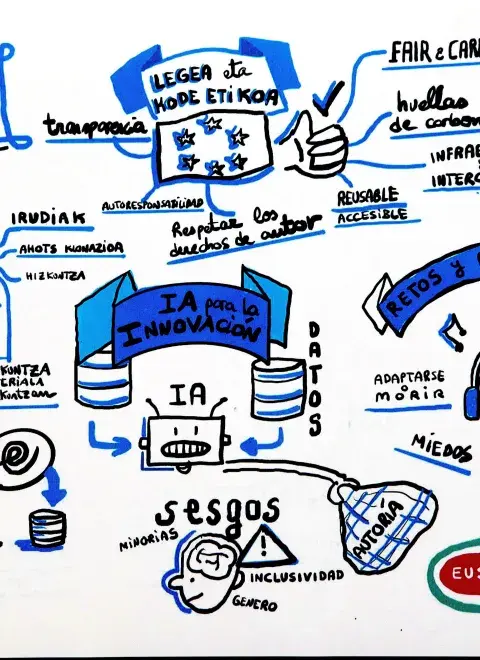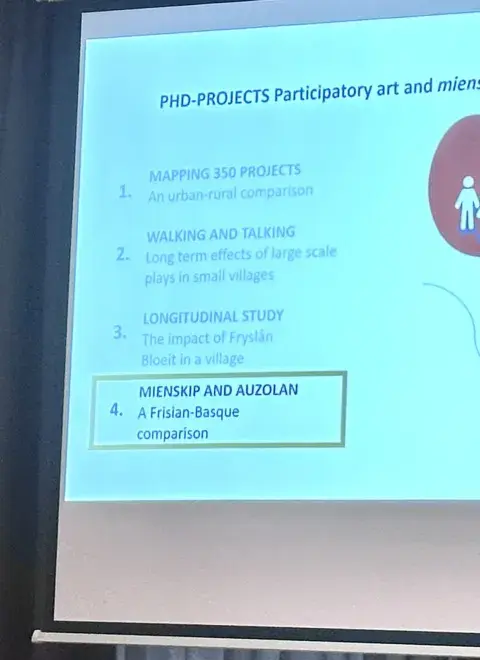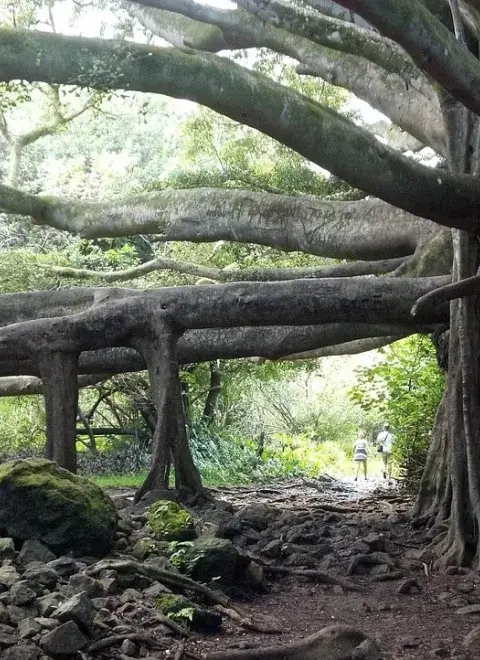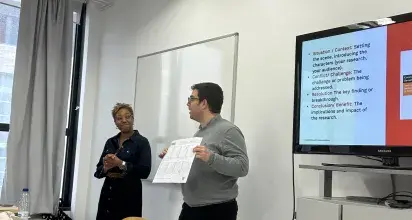
Saskia Walcott and one researcher from the School of Engineering, EHU, during her lecture
- Blog
Social Impact of Research. EHU and Euskampus together leading the path towards societal impact
"Impact, that buzzword, heard everywhere", Áine Mhic Thaidhg
These training sessions, offered by the Social Impact Department of the University of the Basque Country (EHU) in collaboration with Euskampus, have been carried out through October to November at Leioa, EHU Campus. They were designed to help research staff deepen their knowledge, skills, and abilities so that they can incorporate social impact as a fundamental element of their research practice.
Specifically, the objectives of the course have been:
- To provide information on the institutional contexts in which impact is embedded;
- To better understand the impact trajectory and impact processes;
- To provide knowledge and tools for evaluating, monitoring, and communicating impact;
- To analyze strategies for writing the impact section of European proposals.
Through an intensive and enriching six-module program, senior and junior researchers, together with management staff from various institutions—primarily EHU, but also Ikerbasque, Orkestra, and Mondragon Unibertsitatea—engaged in talks and practical exercises led by top-level international speakers, experts in the field of impact.
The modules of the course have been as follows:
Module 1. Understanding social impact, delivered by Igor Campillo Santos and Glória Nunez Rodrigues from Euskampus Fundazioa
Campillo and Nuñez explored the diverse dimensions of impact, being so educational, political, cultural, environmental, social, economic, technological or related to health, amongst others. They emphasized that impact could take different forms—instrumental, capacity-building, or conceptual—and discussed its transformative potential. The experts also underscored the importance of engagement as a key strategy for identifying and addressing societal needs. Moreover, they commented on ENLIGHT Toolkit for Self-Assessment of Impact.

ENLIGHT Toolkit for Self-Assessment of Research Impact Awareness, Literacy and Readiness
Module 2. Institutional Impact Context, by Esther de Smet, Senior Research Policy Advisor, Ghent University (Belgium)
De Smet explored how research organisations can embed a culture of impact through leadership, structures, and everyday practice. What are the building blocks for creating a healthy impact culture? What does this mean for individual researchers and research groups? How do you face the challenges along the way? were some of the questions she dealt with.
Module 3. Planning for impact, by Áine Mhic Thaidhg, Research Impact Officer, University of Galway (Ireland)
Áine (in the photo) offered an interactive session introducing the concept of research impact and providing practical tools to help researchers plan for it from the outset. Participants used the Impact Planning Canvas to identify potential beneficiaries, pathways to impact and ways of capturing evidence. Through examples and hands-on activities, the session showed how impact can be effectively integrated into research design and practice, equipping participants with skills to plan, communicate and deliver impact more confidently.
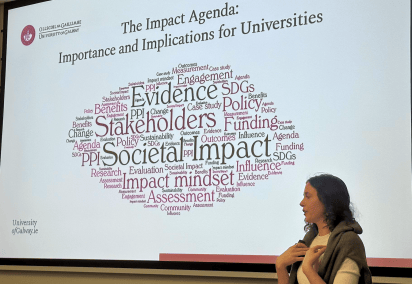
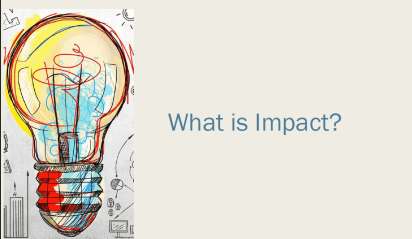
Module 4. Impact Assessment. Evidence Gathering and Monitoring of Research Impact, by Sarah Morton. Director and Co-Founder of Matter of Focus and Honorary Fellow at the University of Edinburgh (United Kingdom)
Sarah’s session had to do with assessing the impact of research on society and the many ways in which research is taken up and used to influence behavior, policy or practice, an inherently complex and challenging process to measure. Using a method based on contribution analysis, Sarah guided participants through creating a pathway to impact that can form the foundations of impact assessment for their work.
Module 5. Drafting the Impact Section in Horizon Europe proposals, by Ana Sofia Rodrigues. F6S Innovation, EU Proposal Developer
Rodrigues unveiled the secrets of why Horizon Europe is impact-oriented and analysed some cross-cutting factors such as:
- Gender perspectives,
- Interdisciplinary and inclusion of Social Sciences and Humanities,
- Open science,
- Dissemination and exploitation,
- Key enabling techonologies.
Photo: Ana Sofia Rodrigues
Module 6. Describing and Communicating Impact by Saskia Walcott. Chief Executive at Walcott Communications (United Kingdom)
Planning dissemination and engagement with impact in mind and identifying impact applying storytelling techniques to communicate were some of the issues covered by Walcott in an enthusiastic and passionate communication spirit. She also guided the participants through a discovery of the 5 or 6 W’s when planning for impact.
Here are a few testimonials from participants in the course:
" Ikastaroaren ondoren argiago edukiko dut zein ebidentzia jaso behar dugun (orain arte jasotzen ez genituenak), edo zein galdera egin behar diogun gure buruari (orain arte egiten ez genituenak). "
“After the course, I will have a much clearer idea of what evidence we need to collect (which we hadn’t considered before) and what questions we should be asking ourselves (which we had previously overlooked).”
" I take from the course a much better understanding of the term "social impact" and its importance from a very early stage. I also have a better understanding of how to measure, value and portray impact of different research projects. The tools we have been taught will be very helpful for me to take back to my organisation, share with my fellow researchers and try to use and implement."
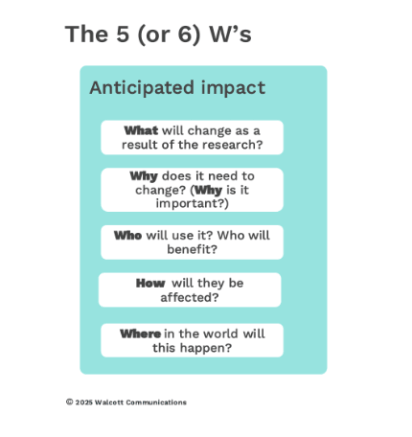
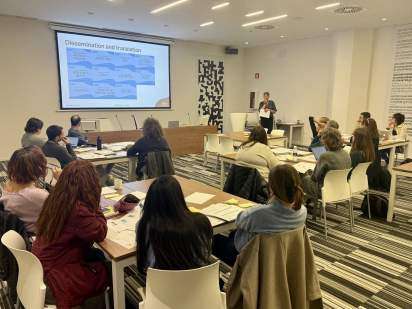
"Nire ikerketa-eremura begira, konturatu naiz modu inkontziente batean kasu egin diogula inpaktu sozialari, baina ez geniola eman behar bezalako garrantzia ematen. Orain badut proiektua perspektiba horretatik hastea, eta lortu ditugun erramintak (diseinu, ebaluazio zein komunikaziora begira) erabiliko ditut."
"Looking at my research field, I realized that we had been paying attention to social impact unconsciously, but without giving it the importance it deserves. Now I can start my project from that perspective and use the tools we’ve gained—for design, evaluation, and communication.”
"Modu intituitiboagoan egiten genituen gauzak sistematizatzeko eta analizatzeko tresnak eman dizkit."
“The course has given me tools to systematize and analyze things that we previously did in a more intuitive way.”
" Proiektuaren diseinuetan oso lagungarria egingo zaigu, baita aurrera aterako ditugun paper, dibulgazio lan eta transferentzia lanean oro har."
“This will be very helpful for project design, as well as for preparing papers, outreach activities, and knowledge transfer work in general.”
(Photo: Sarah Norton during her lecture).
More information about the course Social Impact of Research. How to direct your research towards societal impact?.

Suscríbete a Newskampus
Y recibe nuestras últimas noticias en tu email.
